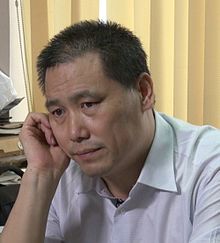Pu Zhiqiang
| Pu Zhiqiang 浦志强 |
|
|---|---|
 |
|
| Born |
17 January 1965 Luan County, Tangshan, Hebei Province, China |
| Nationality | Chinese |
| Occupation | Attorney |
| Known for | Civil rights advocacy |
| Pu Zhiqiang | |||||||
| Chinese | 浦志强 | ||||||
|---|---|---|---|---|---|---|---|
|
|||||||
| Transcriptions | |
|---|---|
| Standard Mandarin | |
| Hanyu Pinyin | Pŭ Zhìqiáng |
Pu Zhiqiang (born 17 January 1965) is a Chinese civil rights lawyer who specialises in press freedom, defamation, and product safety, and other issues. Based in Beijing, he is an executive partner of the Huayi Law Firm. Pu is known for being a prominent member of the Weiquan movement, having advocated for writers and journalists in a number of high-profile cases. Due to the nature of the cases he has taken on and his criticism of official Chinese policies, Pu's actions are monitored by the Chinese state security services, and he has been detained and questioned on several occasions.
Pu Zhiqiang received an undergraduate degree in history from Nankai University in 1986, and a Master of Laws degree from China University of Political Science and Law in 1991. When he was a postgraduate student, he joined the pro-democracy movement in 1989. Writing for the New York Review of Books, Pu described how he returns to the square annually with friends and family to mark the anniversary of the crackdown in fulfillment of a promise he made in 1989.
Pu is known for being a prolific blogger on the Weibo platform, and for his "casual sarcasm." His posts are characterised by NYRB as "short, Twitter-like" and are "unusual for their cleverness." He is well known as a human rights activist, and his blogging has tested the boundaries of Chinese government censorship. He has tens of thousands of followers. However, once his Weibo accounts reach a certain level of popularity, censors delete his account and he has to start again.
Pu has been involved in a number of high-profile freedom of speech cases in China, defending dissident writers and journalists. In 2004, he defended writers Chen Guidi and Wu Chuntao. The couple was facing libel charges for their portrayals of local Communist Party official Zhang Xide in their best-selling book A Survey of the Chinese Peasants. The case—and Pu's litigation in court—garnered international attention. Philip Pan of the Washington Post wrote that "by the time [Pu] finished his cross-examination, the mood in the courtroom had begun to change. When the trial ended three days later, ... it seemed as if Zhang – and the Communist Party itself – were the ones on trial." The same year, Pu won a landmark victory on behalf of the China Reform magazine, which was similarly facing libel charges for its critical reporting on a real estate developer. The court decided in the magazine's favor, ruling that journalists are entitled to legal immunity on the condition that their stories are based on a reasonably believable source, rather than hearsay or fabrication.
...
Wikipedia
